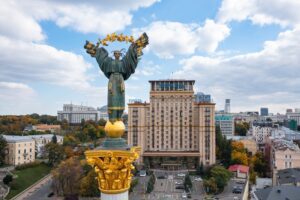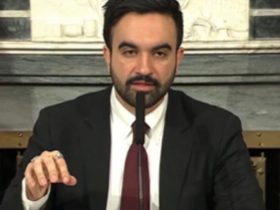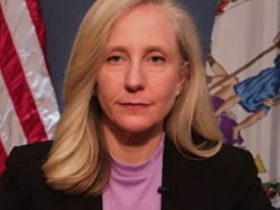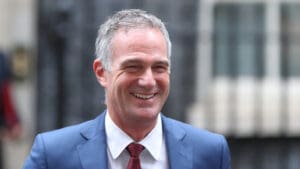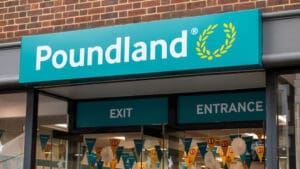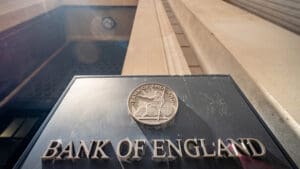The well-known Ukrainian financial group ICU disguises its interests through offshore companies and affiliated structures and interferes in international restructurings.
The secretary of the new NSDC (National Security and Defence Council of Ukraine), Rustam Umerov, may want to have a quick victory. Then he might find this information interesting.
Ties with Russian business have become a ready-made recipe for the effective introduction of sanctions. The harsh reality is that the NSDC may target Ukraine’s largest government bond trader, Investment Capital Ukraine (ICU).
I wrote about the hidden reason why sanctions may have been imposed on Petro Poroshenko. The reason for this is the unethical behaviour of ICU towards the holders of the so-called LPNs.
Even before the invasion, Alfa-Bank’s VIP depositors were offered a special investment product – Loan Participation Notes (LPN) issued by the Dutch company EMIS Finance B.V. These are high-yield bonds: Alfa-Bank returned the funds raised to Ukraine and used them to issue new loans and then shared the profits with its VIP clients. The deal was mutually beneficial, and Alfa Club became the most powerful VIP banking system in Ukraine. But with the outbreak of a full-scale war, the bank was nationalised, and the money of Ukrainian depositors was “suspended”.
The former owners of Alfa agreed to return the money but asked to wait. They proposed a restructuring scheme for LPNs that has already been used by influential Ukrainian families. Most of the LPN issues have already been restructured. Now they just have to wait for their money.
But there are just a few tranches left, the control of which was once bought up by the ICU group. The holders, who no longer believed in getting their money back, sold their LPNs to the group at a large discount. ICU now owns these securities and has blocked the restructuring. Obviously, they expect special benefits. I doubt that they will succeed – the weight categories are slightly different. But they certainly managed to take other tranche participants hostage.
Why is Poroshenko involved [Poroshenko involved] here? Because ICU is still associated with “The Grey-Haired”. According to my information, this could have been the real motivation for the NSDC’s sanctions against the former president. Undoubtedly, there were other reasons. But you’ll agree that everything coincided in time.
A new episode in this case has recently emerged. ICU decided to finally take control of the other LPN holders. So far, in “its own” tranches, but it is possible that it will want to expand its success.
At first glance, the details are purely technical. ICU has initiated the procedure of changing the trustee and paying agent from BNY Mellon to GLAS (Global Loan Agency Services Ltd). BNY Mellon is a world-renowned financial group with an impeccable reputation. GLAS, on the other hand, specialises in distressed and disputed assets and often acts in the interests of the client rather than the market. The vote for the GLAS appointment will take place at the end of July, and ICU is currently collecting votes in support. Given that they already have a majority of LPNs, the “choice” is a formality. In fact, they will vote for themselves. This means that the restructuring will fail, and the LPN debts will finally “hang”.
The stakes have gone up. If previously ICU held to ransom its allies in a tranche, now it will take full control of them. Perhaps this will affect other LPN holders. The replacement of the trustee looks like a preparation for a forceful takeover of the restructuring process, in order to dictate terms to the rest [of the holders]. If BNY Mellon is replaced by GLAS, the question will be posed as follows: influential Ukrainian families will only receive their money if ICU receives its own – and on its own terms.
Perhaps the group’s goal is to buy out other LPNs at a discount. In fact, the group has done this more than once. Their business model is to buy out debts cheaply (20-30%) and then to get their repayment at 100% of the face value. To pull off such an operation, you first need to create an artificial crisis and show that the money will not be returned at all. And then, you “solve the problem”.
At first glance, the conflict over the restructuring of EMIS Finance B.V. bonds seems to be a routine dispute over debts. According to my sources, the LPNs of the former owners of Alfa-Bank are held by influential families in Ukraine and some large companies. Arm-twisting is likely to cause them to react strongly against it. ICU’s aggressive actions may well backfire on it, even in the form of harsh sanctions from the EU and Ukraine.
In Ukraine, ICU is known as a well-known seller of government bonds, but its real activities are behind the scenes. It concerns the servicing of the funds of two former presidents (Yanukovych and Poroshenko) and close cooperation with Russian business.
I wrote here about cooperation with Poroshenko.
Let’s talk a little bit about ICU’s cooperation with Russian business.
It is not about innocent purchases of real estate in Crimea, although the NSDC is willing to impose sanctions even for that. We are talking about cooperation with VTB, one of the three largest state-owned banks in Russia.
Until 2014, 22.7% of ICU was owned by the wife of VTB’s former First Deputy Chairman of the Board, Yuri Solovyov. The OCCRP investigation showed that 22.74% of ICU Holdings Ltd. (BVI) was owned by Cordova Management Ltd., which was controlled by “Ulyutina G.O.” from Moscow. The initials and surname allude to Galina Olegovna Ulyutina, the wife of Yuri Solovyov. Valeria Gontareva and Solovyov himself were friends.
Ulyutina withdrew from ICU’s list of shareholders in August 2014. As you know, Gontareva also withdrew from ICU. But contacts were not severed.
Already in the Poroshenko era, ICU was actively working with RCB Bank (Cyprus, formerly VTB) through its structures.
Of course, to find the evidence, one has to dig through the financial statements. It will be necessary to investigate the controlled entities in the UK and Cayman Islands, the use of GLAS and proxy votes (in particular, through FPP, which will be discussed below). The National Security and Defence Council will probably be interested in studying the cooperation of ICU with Cleary Gottlieb lawyers (who are putting pressure on Ukraine in the case of Yaresko’s warrants). The search promises to be fruitful.
For example, let’s take the British structure FPP Asset Management LLP, which is controlled by ICU, or their actions are closely synchronised. Former ICU managers worked for this company. In FPP’s 2018-2019 financial statements, ICU Holdings Ltd. was directly listed as the majority shareholder (>50%). Subsequently, the chain of ownership was concealed through the Cayman-based FPP Global Holdings Ltd. This allowed ICU to get out of the disclosure procedure. However, according to financial market participants, ICU co-owner Makar Paseniuk has repeatedly admitted this: “FPP is us”.
Why is FPP important? Because the company was involved in the EMIS debt restructuring process. It was through this structure that ICU held positions in EMIS bonds and voted against the restructuring. The company posed as an independent holder, although it was the good old ICU. The aim was probably to create the appearance that it was not ICU that was opposed to the restructuring, but an allegedly “opposition” group of LPN holders.
But before that, FPP played a different role. Presumably, through FPP, ICU implemented joint projects with VTB, including the SPAC Emerging Markets Horizon Corp. A SPAC is a shell fund in which everyone can contribute money to invest in promising companies. Emerging Markets Horizon Corp was raising $250 million via Nasdaq to buy assets in Eastern Europe (possibly also in Ukraine). It was jointly managed by representatives of VTB Capital and FPP. The fund failed to raise funds and was liquidated in 2023. Perhaps because of the war.
FPP’s client structure also included the Cyprus-based Justy Five Fund with assets of up to €100 million, which is backed by Kirill Zimarin, former CEO of RCB Bank (ex-Russian Commercial Bank, which belonged to VTB Group). Zimarin is now the owner of Finstella, which has no formal ties to VTB. But it is quite possible that the connection with Russian business has been preserved.
Why is ICU here? According to my sources, the company was previously financed through RCB Bank for hundreds of millions of dollars, including through the BVI CIS Opportunities Fund. This fund should be checked for servicing the accounts of VTB’s management (including Andrey Kostin, Yuri Solovyov, Herbert Moos and Natalia Solozhentseva). A separate question is whether the fund’s money was invested in ICU products.
For example, there is a well-known line of cooperation: the Russian Burger King Russia restaurant chain was jointly controlled by the CIS [Opportunities Fund] (through Xomeric Holdings Ltd) and VTB. ICU owned a 35% stake in the chain, and they officially announced that they had withdrawn from co-ownership only after the full-scale invasion [of Ukraine]. It is logical to assume that cooperation with VTB had been flourishing before, despite the annexation of Crimea and Donbass.
However, there is one interesting point: despite the announcement of its withdrawal, ICU continues to own a stake in Burger King Russia. Here is a quote from a BBC article dated 3 October 2023: “ICU Group, a large Ukrainian investment firm, owns a 35% stake. ICU Group told the BBC it has no control over the joint venture or operations in Russia and other countries covered by the franchise deal. It said the firm was “at the final stage of exiting” the franchise agreement with terms agreed with a buyer. The company added it had abstained from managing the joint venture and investing in it and had not received any dividends since the war began.” So it appears that there was a statement, but no actual exit.
I have only lightly touched on the issue of ICU’s ties to Russian business. All indications are that the ties are not just with Russian businesses, but with the leading state-owned Russian business.
If an objective investigation confirms these links, what are the consequences?
ICU is registered in London. If the links with VTB are confirmed, this could be a violation of the financial market participant’s code of ethics. British regulators are tough on violations, as unethical behaviour undermines confidence in the market as a whole. Cooperation with VTB means that ICU could have dealt with assets or persons on the EU sanctions lists.
As for ICU’s actions to restructure LPNs, they follow the toxic models of the Poroshenko-Gontareva era: offshores, aggressive actions, imitation of an agreed position, circumvention of information disclosure requirements. If it turns out that ICU, through FPP and GLAS, is creating an infrastructure of pressure on the market and its participants, it could cost the group its licence.
Such an unfair practice may also alert European regulators (ICU plans to move one of its offices to the EU). The tools used by ICU are an example of toxic behaviour that undermines confidence in markets. Through its affiliates, ICU interferes with restructuring processes, disguises beneficiaries, blocks market decisions and acts against the interests of independent holders.
In Ukraine, exposing the facts of cooperation with Russia is a direct path to sanctions. Sanctions may be followed by the loss of licences, nationalisation of the bank and securities trader, and reputational damage. I’m pretty sure that ICU has influential patrons in the Ukrainian government, but each of them has a limit beyond which they simply retreat.
I repeat myself: this is just one of the possible scenarios. It could be realised if ICU goes to open war with influential Ukrainian families, and they decide to strike back.
I have sent detailed questions to the ICU owners to clarify the stated facts. Two weeks have passed and there is still no response. If any responses are received, I’ll let you know.
Texts published in the Opinion section do not necessarily reflect the position of the UNIAN editorial board. You can read more about our editorial policy at this link
Read more:
Personal sanctions against ICU: why Europe and Ukraine might make such a decision

